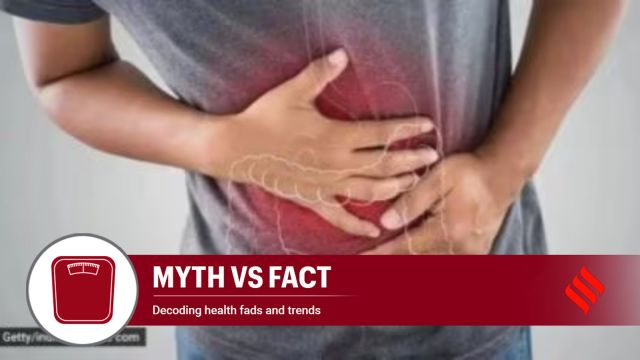Is your stomach ulcer because of spices and red chilli?
Dr Anukalp Prakash, gastroenterologist from CK Birla Hospital, Gurugram, busts long-held myths.
 While spicy foods may exacerbate symptoms for individuals already suffering from ulcers, they are not the root cause of the condition. (Representational)
While spicy foods may exacerbate symptoms for individuals already suffering from ulcers, they are not the root cause of the condition. (Representational)For some reason, everybody seems to believe that spicy foods cause ulcers. It’s a common misconception that has been passed down through generations. Which is why many of us avoid our favourite dishes for fear of upsetting our stomach. It’s time to set the record straight and dispel this myth once and for all.
The Culprit Behind Ulcers
Contrary to popular belief, spicy foods are not the primary triggers of ulcers. Instead, the majority of ulcers are triggered by the presence of the Helicobacter pylori (H. pylori) bacteria or prolonged usage of nonsteroidal anti-inflammatory drugs (NSAIDs) such as ibuprofen and aspirin, which interfere with chemicals that help regulate the protective lining of the gut. H. pylori spreads through contaminated food and water or unsanitary conditions. It causes ulcers by sticking to and growing in the lining of the stomach walls, producing inflammation. This condition allows the stomach acids to easily damage the lining. Address the bacteria with medication. Similarly, individuals who rely heavily on NSAIDs for pain management should explore alternative treatment options under the guidance of healthcare professionals.
Some causes of mouth ulcers include trauma, infections and chemotherapy.
What do spicy foods do then? While spicy foods may exacerbate symptoms for individuals already suffering from ulcers, they are not the root cause of the condition. In fact, research suggests that capsaicin, the compound responsible for the heat in spicy foods, may offer some benefits for gastrointestinal health. Studies have indicated that capsaicin can inhibit the growth of H. pylori bacteria, thus potentially reducing the risk of developing ulcers. Additionally, capsaicin has been found to promote the production of protective mucus in the stomach lining, which can help guard against ulcer formation.
A 2015 study in BMJ showed that those who consumed spicy foods seven days a week showed a 14 per cent relative risk reduction in total mortality than those who limited consumption to once or twice a week. The association between spicy food consumption and total mortality “was stronger in those who did not consume alcohol than those who did.”
Individual Variability and Tolerance: It’s important to acknowledge that tolerance to spicy foods varies among individuals. While some may enjoy fiery dishes without experiencing any adverse effects, others may find that spicy foods exacerbate their gastrointestinal symptoms. For those in the latter category, it’s advisable to exercise caution and avoid consuming foods that worsen their condition. Stay away from spicy foods if you have irritable bowel syndrome, dyspepsia, or inflammatory bowel disease (IBD) as they could just exacerbate the discomfort. Spicy foods don’t cause haemorrhoids but that burning feeling could be because you have anal fissures.
Milk and ulcers: Although many think that drinking milk can soothe their ulcer, truth is it can’t help prevent or relieve an ulcer. In fact, it might actually worsen the condition by prompting your stomach to produce more acid.
Photos



- 01
- 02
- 03
- 04
- 05




























